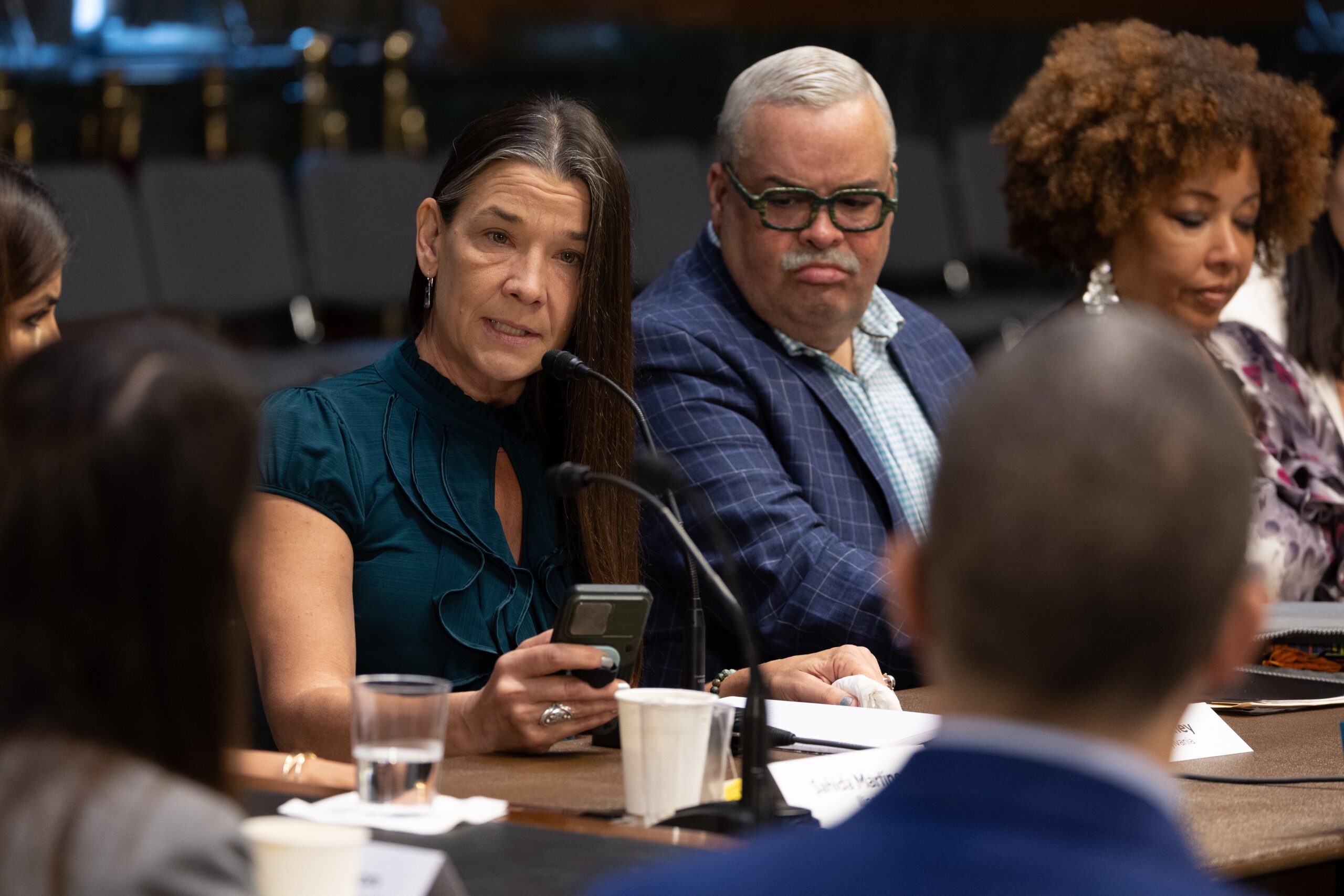A Growing Movement to End Medical Debt: Federal Action Now
Medical debt is a symptom of a much larger problem: health care is far too expensive and there aren’t enough protections in place for people seeking care.
Backed by a growing coalition of more than 70 local, state and national partners, Community Catalyst is spearheading efforts to ensure the Biden-Harris administration uses all the tools in its toolbox to make system-level change. We’ve seen some important progress, but we need to keep the pressure on.
- Learn more about what the IRS/Treasury can do to hold non-profit hospitals accountable to their tax breaks.
- Learn more about what the Consumer Financial Protection Bureau (CFPB) can do to prevent all medical debt from showing up on credit scores; and to ban the promotion of deferred interest credit cards in all healthcare settings
Momentum
Systems-level change is possible when we come together to ladder community to state to federal strategies, but there are powerful forces working to block our progress. We can’t out spend our opponents, but we can out organize them.
In April of 2022, we celebrated the Biden-Harris administration’s announcement that it would take steps to address the problem of medical debt. Since then, Community Catalyst, partners, and advocates, have convened a National Day of Action, met with dozens of advocates and agencies, and made progress towards our goals. More than 10,000 people have sent petitions urging for action – representing all 50 states as well as Puerto Rico and Washington, D.C. Many have shared their stories about the myriad of reasons the current system has failed, often as a result of lackluster enforcement and profit-driven motives of health systems, CEOs and credit card companies.

The Biden-Harris administration clearly understands the importance of addressing this issue. Since taking office, it has:
- Taken steps to prevent all medical debt from impacting credit scores, which will immediately help people like Misty from Colorado: At age 23, Misty underwent life-saving heart surgery, leaving her with $200,000 in medical bills and unable to divorce her abusive partner. Because medical debt had destroyed her credit score, Misty could not get housing, a car, or a credit card on her own, forcing her to stay in an abusive relationship for 20 years. Misty studied and got her license to be an insurance provider, but she could not get a job because prospective employers checked her credit as part of the hiring process.
- Worked to rein in the promotion of predatory deferred interest credit cards in health care settings, which would protect people like Sarah from Connecticut, who spent years trapped in medical debt because of deferred interest cards: “I had no idea what my other options were, only that the medical office told me this card was the best option, so I believed it. It WAS predatory. And it stopped me from contributing to other areas of the economy. I couldn’t buy a car, go out to dinner, or purchase other non-necessity items because all my money was going toward that card. I had no idea what kind of hole I was getting myself into. If our medical system requires going into this kind of debt then our medical system is broken. And something needs to change.”
- Taken steps to better understand the role that hospitals play in contributing to the medical debt crisis – with increased focus on non-profit hospitals that are operating more like for-profit entities. People like Sahida in Illinois, whose experience inspired her to act, are urging for more protections and enforcement: “I went back to the hospital to make clear that we were eligible for financial aid, and they apologized.” Ultimately, the hospital eliminated their debt — which made it possible for Sahida’s husband Arturo to continue to see his neurologist for continued and essential care.
- Worked to address the gaps and inconsistencies in dental coverage, a leading driver of medical debt, which would improve the ability for people enrolling in marketplace coverage to get dental benefits for people like Carol in Wyoming: “My dentist’s office threatened to have me arrested and jailed when I had trouble paying the bill for a tooth extraction that turned into urgent dental surgery. The dental receptionist demanded cash on the spot. I wound up not paying my other bills to get out from under the dental bill. This is NOT how I expected my life in retirement to be!”
Demand action from the Biden-Harris administration on the medical debt crisis in America
UrgencyUrgency
Medical debt is an issue of race equity, health and economic justice. The burden is carried disproportionately by adults without insurance, women, Black and Latinx adults, parents, immigrants, and those with lower incomes.
- According to a recent KFF survey, unexpected medical bills and health care costs top the list of expenses that adults, regardless of partisanship, say they worry about affording, with three in four adults saying they are “very” or “somewhat worried” about being able to afford unexpected medical bills (74%) or the cost of health care services (73%) for themselves and their family.
- Black and Latinx adults report a disproportionate amount of medical debt compared to white adults — and states that have blocked Medicaid expansion continue to have higher rates of medical debt.
- According to a 2020 report from The Commonwealth Fund, 48 percent of people with medical debt used up all their savings to pay off their medical bills; 40 percent received a lower credit rating as a result of their medical debt; and 1/4 were unable to pay for basic necessities such as food, heat, or rent.
- According to a 2023 Lown Institute report, if non-profit hospitals wanted to, they could easily eliminate medical debt for more than 18 million people in America — just with the money that they should be, but are not, spending on the communities they are designed to serve.
The effects of medical debt are far-reaching: all too often, individuals delay or forgo treatment due to cost. Some providers deny treatment because an individual has medical debt or is unable to pay. For others, damaged or ruined credit after a medical procedure may upend their financial stability. They may experience drained savings, bankruptcy, stress, anxiety, and altered life trajectories – all because they got care.
The Biden-Harris administration can take a series of specific steps — which are endorsed by dozens of local, state, and national groups — to help tens of millions of people from crushing medical debt. To ensure economic security and access to care for all, these actions must be community-driven and centered in race equity and health justice.
We’re Taking ActionWe’re Taking Action
In March 2023, Community Catalyst, alongside state and national partners, announced our shared support for federal action to address the medical debt crisis in America. In the year since, the power of that coalition has grown – bringing together even more organizations, advocates, and storytellers calling for change.
The campaign, led by Community Catalyst, sent two letters — one to the Internal Revenue Service (IRS) and Department of Treasury, and one to the Consumer Financial Protection Bureau (CFPB) — with specific executive actions the administration can take.
- Bolster hospital financial assistance policies to prevent people from incurring medical debt in the first place.
- Regulate excessive charges from non-profit hospitals who are obligated to provide charity care or financial assistance to patients in exchange for their tax-exempt status.
- Protect people from harsh billing and collection practices like foreclosures, wage garnishment, and bank account seizures.
- Prevent non-profit hospitals from denying care to individuals with medical debt.
- Strengthen enforcement of regulations to ensure non-profit hospitals are providing sufficient community benefits, and making reasonable efforts to determine whether individuals are eligible for financial assistance prior to initiating extraordinary collection actions.
- Prohibit all medical debt from showing up on credit reports by enhancing protections in the Fair Credit Reporting Act (FCRA).
- Eliminate the promotion of predatory deferred interest credit cards in medical settings, such as doctors and dental offices, as well as hospitals.
- Undertake aggressive enforcement against unfair, deceptive, and abusive hospital practices which can prevent debt from being waived or forgiven by hospital policies.
“What the whole country should know is that health care is not a business. Health care is a right.”
Learn more



